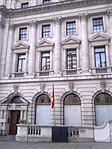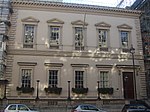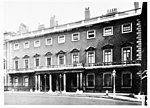Clarence Club
The Clarence Club, formerly known as the Literary Union Club, was a gentlemen's club founded in 1826, as a socially exclusive dining society that met in Conduit Street, Mayfair, by the poet Thomas Campbell, with the objective of the facilitation of social connections between those with an interest in the arts, philosophy, finance, trade, business, and science. Most of its members were English, but, originally, it included a significant core of members of Scottish descent. It is notable for its prohibition, then radical, of the extension of membership to any member of the press. In 1829, it occupied premises in Regent Street, renamed itself the Literary Union Club, and revised its membership statutes to make it less exclusive. It had over 700 members by 1831. After membership became too numerous, it subsequently renamed itself again, as the Clarence Club, occupied 12 Waterloo Place, Pall Mall and limited its membership to 600. It was dissolved in April 1834. Campbell's Literary Association of the Friends of Poland, founded in 1831, took most of its membership from the Clarence Club.
Excerpt from the Wikipedia article Clarence Club (License: CC BY-SA 3.0, Authors).Clarence Club
Waterloo Place, City of Westminster Covent Garden
Geographical coordinates (GPS) Address Nearby Places Show on map
Geographical coordinates (GPS)
| Latitude | Longitude |
|---|---|
| N 51.50764 ° | E -0.13316 ° |
Address
Villandry
Waterloo Place 12
SW1Y 4NR City of Westminster, Covent Garden
England, United Kingdom
Open on Google Maps









